AMD Ryzen 7 2700X Review: Redefining Ryzen
Why you can trust Tom's Hardware
VRMark, 3DMark And AotS: Escalation
VRMark & 3DMark
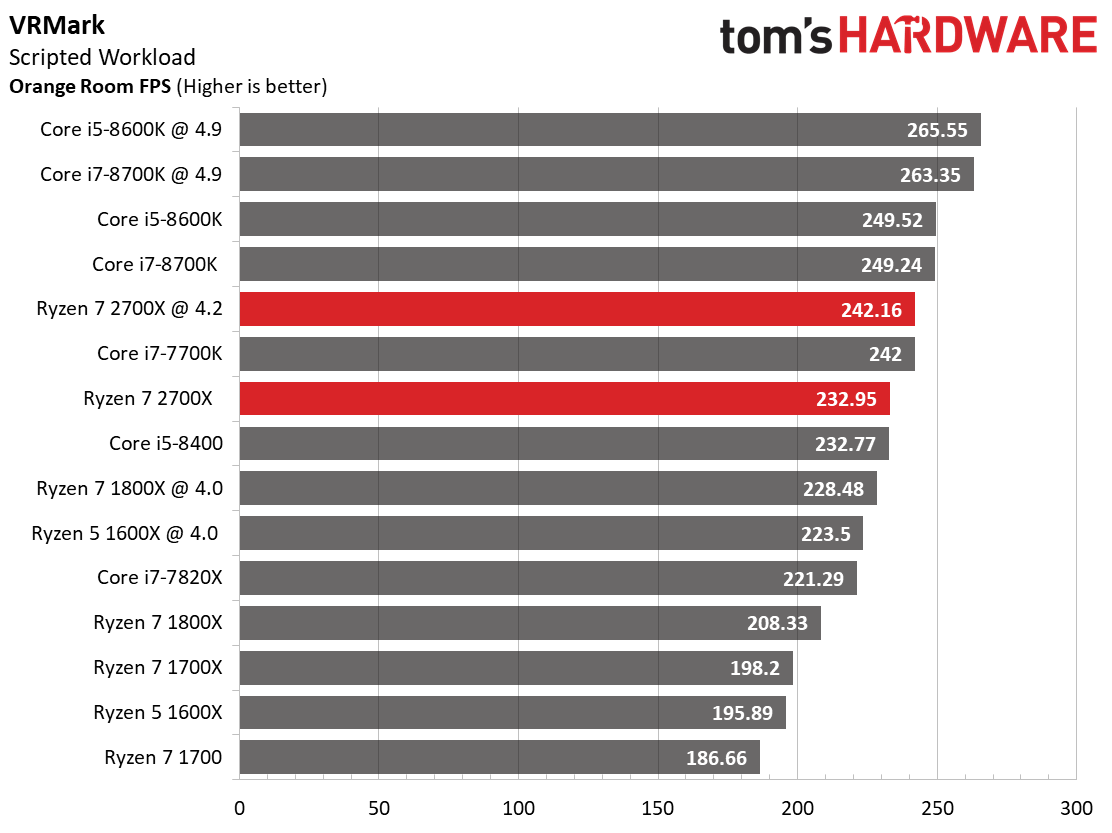
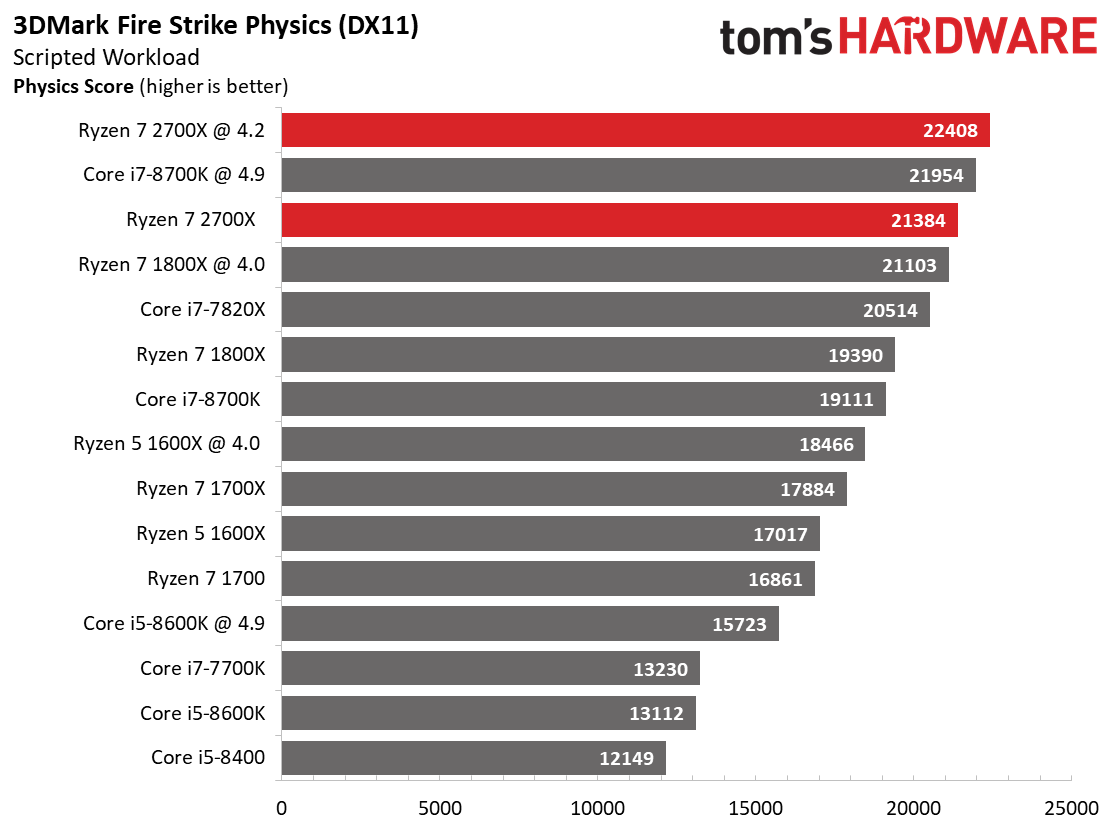
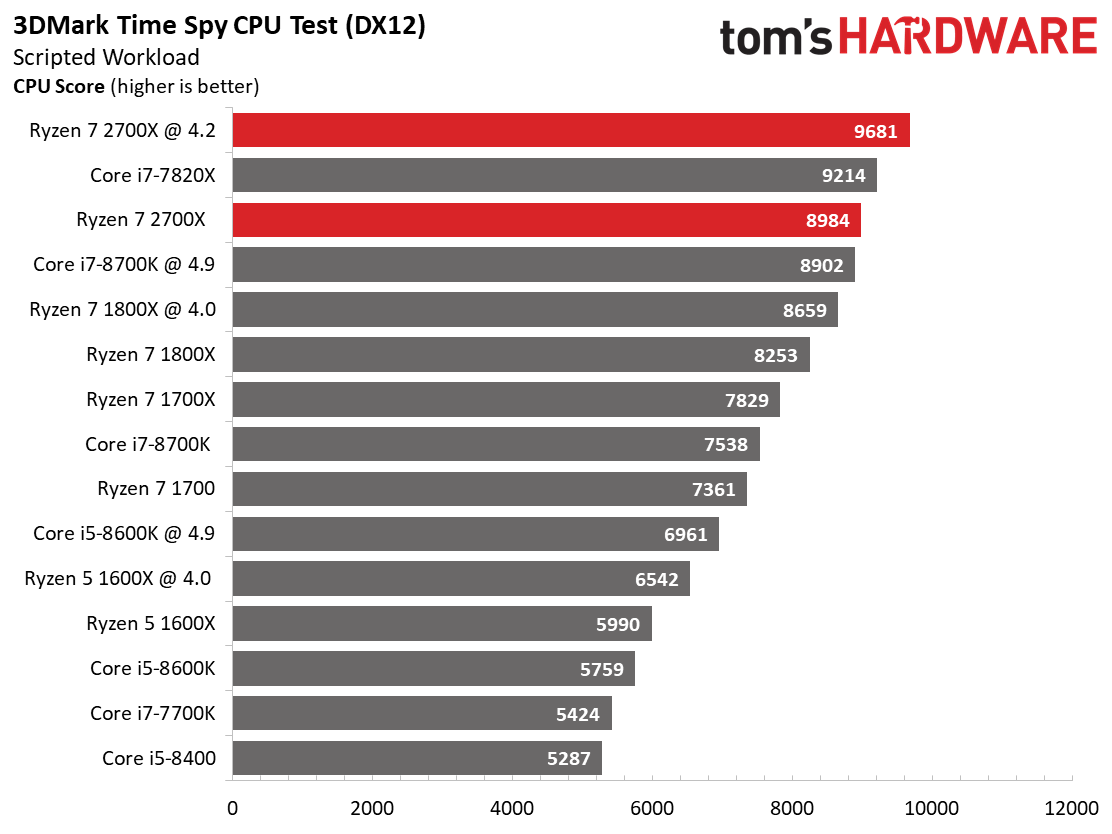
Gaming is where rubber meets the road for most enthusiasts. AMD tells us that its 2000-series processors should be nearly equivalent to Intel's comparable models, at least at stock settings. And there's no doubt that Ryzen 7 2700X will excel in heavily-threaded titles. But tests that are sensitive to clock rate and IPC throughput, such as VRMark, have traditionally been a challenge for Ryzen.
The 2700X bridges the gap between Intel's processors and first-gen Ryzen. AMD's stock 2700X outstrips the Ryzen 7 1800X by 11.8%. More impressively, it also beats the overclocked 1800X by 2%. The 2700X's lead over its predecessor extends further after tuning its cores and memory subsystem.
Synthetic benchmarks are great because they tend to scale more clearly than real-world applications. 3DMark's real usefulness lies in measuring the amount of performance available to game engines, giving us a peek at what highly-optimized games could be capable of.
Ryzen 7 2700X's 16 threads beat Core i7-8700K's 12 threads in our DX11 and DX12 CPU tests, even after overclocking. The 2700X also bests Intel's $589 Core i7-7820X during both tests.
Ashes of the Singularity: Escalation
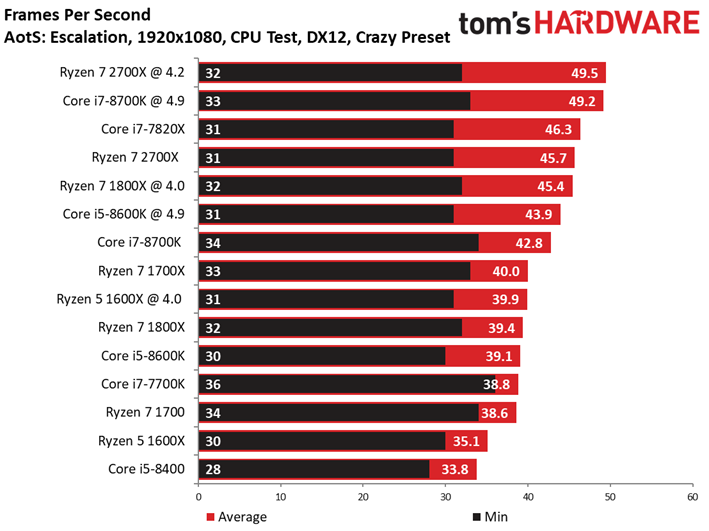
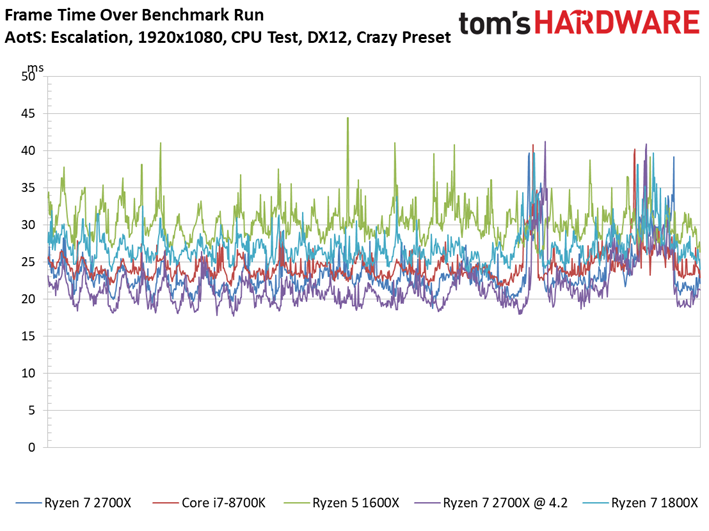
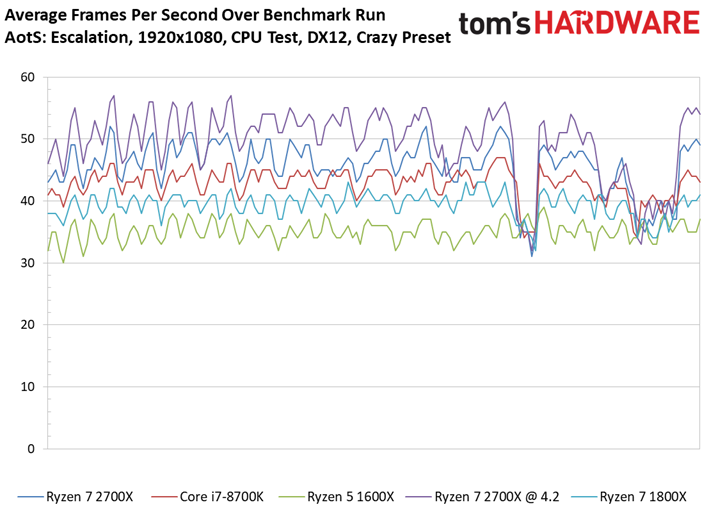
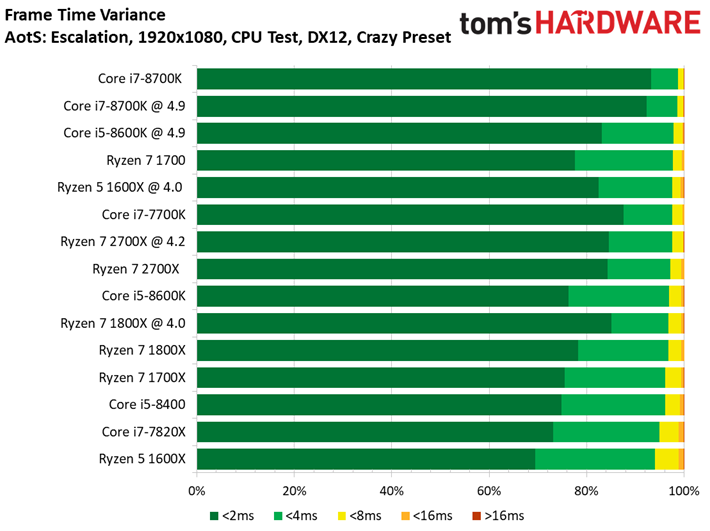
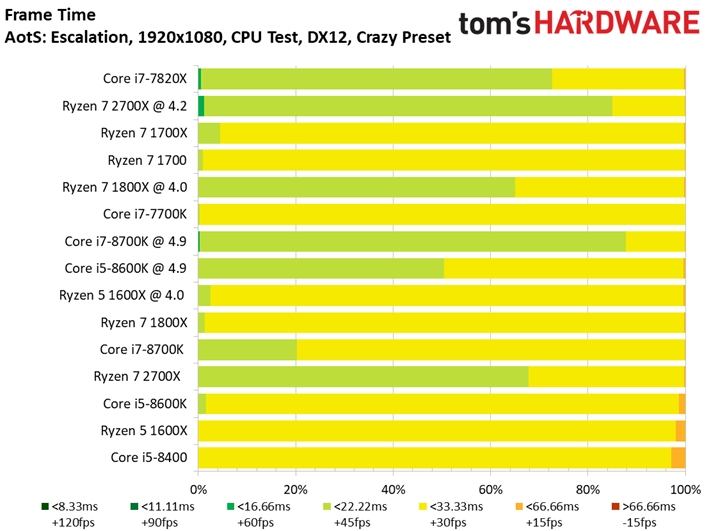
Ashes of the Singularity: Escalation evokes memories of AMD's early struggles with the Zen architecture. This was one of the first games to receive an update optimized for AMD's processor design.
Although the patch improved performance, Ryzen 7 1800X still fails to beat a stock Core i7-8700K. But Ryzen 7 2700X and its Precision Boost 2 algorithm turn the tables, giving AMD an advantage in stock and overclocked trim.
MORE: Best CPUs
Get Tom's Hardware's best news and in-depth reviews, straight to your inbox.
MORE: Intel & AMD Processor Hierarchy
MORE: All CPUs Content
Current page: VRMark, 3DMark And AotS: Escalation
Prev Page Overclocking, Spectre, And Test Setup Next Page Civilization VI Graphics & AI, Dawn of War III
Paul Alcorn is the Editor-in-Chief for Tom's Hardware US. He also writes news and reviews on CPUs, storage, and enterprise hardware.
-
Ninjawithagun Once again, Tom's provides an incorrect comparison in this review. Intel's 8700K is comparable to the 2600 or 2600X and NOT the 2700 or 2700X. Just count the number of cores and threads and one should be able to figure that out O.oReply
Whine all you want. Just because you down vote me only means you don't know how to read or count :P -
Sakkura Reply20899022 said:Once again, Tom's provides an incorrect comparison in this review. Intel's 8700K is comparable to the 2600 or 2600X and NOT the 2700 or 2700X. Just count the number of cores and threads and one should be able to figure that out O.o
The 2700X costs $329, the 8700K costs $359. It is a very reasonable comparison to make. -
justin.m.beauvais It sure is nice to see an AMD chip up there in the thick of it with Intel's best offerings. Competition has finally officially returned. I'm impressed that AMD gained so much ground and managed to make the price more competitive than the 1800x was. It is slightly disappointing that overclocking remains less impressive than the Intel offerings, but everything else sort of makes up for that.Reply
I didn't feel like AMD was quite "there" yet with the 1000 Ryzens, but with the 2000 series I feel like we can finally say that they have arrived. -
Ninjawithagun Reply20899035 said:20899022 said:Once again, Tom's provides an incorrect comparison in this review. Intel's 8700K is comparable to the 2600 or 2600X and NOT the 2700 or 2700X. Just count the number of cores and threads and one should be able to figure that out O.o
The 2700X costs $329, the 8700K costs $359. It is a very reasonable comparison to make.
Incorrect. It has nothing to do with price. Comparing like CPU architectures is the only logical course of action. 6 core/12 thread vs 8 core/16 thread makes no sense. Comparing the Intel 8700K 6 core/12 thread @ $347 to the AMD 2600X 6 core/12 thread @ $229.99 makes the most sense here. Once the proper math is done, AMD destroys Intel in performance vs. cost, especially when you game at any resolution higher than 1080P. The GPU becomes the bottleneck at that point, negating any IPC benefits of the Intel CPUs. I know this how? Simple. I also own a 8700K gaming PC ;-)
Once again, whine all you want. Just because you down vote me only means you don't know how to read or count :P -
bfwhsm Now, do the tests again with meltdown/spectre applied on intel cpus, as you should.Reply
And you will see a VERY different story, with 2700k destroying 8700k in almost every measure).
(check out anandtech's review to get an idea) -
Ninjawithagun Reply20899131 said:Now, do the tests again with meltdown/spectre applied on intel cpus, as you should.
And you will see a VERY different story, with 2700k destroying 8700k in almost every measure).
(check out anandtech's review to get an idea)
I will definitely check out that review as well. Thanks bfwhsm! -
tripleX Reply20899131 said:Now, do the tests again with meltdown/spectre applied on intel cpus, as you should.
And you will see a VERY different story, with 2700k destroying 8700k in almost every measure).
(check out anandtech's review to get an idea)
Maybe you should read the comments on the AnandTech article. They all point out that the test results don't match any other site's results. -
Sakkura Reply20899157 said:20899131 said:Now, do the tests again with meltdown/spectre applied on intel cpus, as you should.
And you will see a VERY different story, with 2700k destroying 8700k in almost every measure).
(check out anandtech's review to get an idea)
Maybe you should read the comments on the AnandTech article. They all point out that the test results don't match any other site's results.
... because of the different testing procedure that he just referred to.